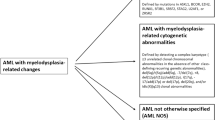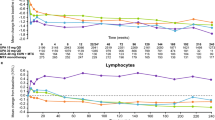Abstract
Introduction
Tumor lysis syndrome (TLS) is a life-threatening complication in patients with hematological disease and/or solid tumors that results from rapid, large-scale tumor necrosis occurring spontaneously, or more commonly, as a result of chemotherapy. TLS is characterized by metabolic and electrolyte imbalances that include hyperuricemia, hyperkalemia, hyperphosphatemia, and hypocalcemia. Identification of risk groups as well as early detection of TLS is crucial for the establishment of appropriate strategies of prophylaxis and treatment.
Methods
A review of the peer-reviewed literature on TLS between 1990 and 2011 was conducted via a systematic search of the PubMed database using the keywords “TLS” [AND] “management,” “risk evaluation,” “prophylaxis,” and “treatment.” An expert opinion-based approach was used to review the national and international recommendations and guidelines on the topic.
Results
The PubMed search produced 90 results, all of which were evaluated. These studies, together with a recent international consensus panel provided recommendations for evaluating the risk of TLS and providing prophylaxis. Five algorithms are presented that consider all of the factors when assessing the risk for neoplastic disease in general, and specifically for leukemia and lymphoma.
Conclusion
The present report provides clinicians with an easily consultable tool to guide the evidence-based management of this oncohematological emergency.
Similar content being viewed by others
References
Cairo MS, Bishop M. Tumour lysis syndrome: new therapeutic strategies and classification. Br J Haematol. 2004;127:3–11.
Pession A, Melchionda F, Castellini C. Pitfalls, prevention, and treatment of hyperuricemia during tumor lysis syndrome in the era of rasburicase (recombinant urate oxidase). Biologics. 2008;2:129–141.
Mughal TI, Ejaz AA, Foringer JR, Coiffier B. An integrated clinical approach for the identification, prevention, and treatment of tumor lysis syndrome. Cancer Treat Rev. 2010;36:164–176.
Annemans L, Moeremans K, Lamotte M, et al. Incidence, medical resource utilisation and costs of hyperuricemia and tumour lysis syndrome in patients with acute leukaemia and non-Hodgkin’s lymphoma in four European countries. Leuk Lymphoma. 2003;44:77–83.
Wössmann W, Schrappe M, Meyer U, Zimmermann M, Reiter A. Incidence of tumor lysis syndrome in children with advanced stage Burkitt’s lymphoma/leukemia before and after introduction of prophylactic use of urate oxidase. Ann Hematol. 2003;82:160–165
Hande KR, Garrow GC. Acute tumor lysis syndrome in patients with high-grade non-Hodgkin’s lymphoma. Am J Med. 1993;94:133–139.
Coiffier B, Altman A, Pui CH, Younes A, Cairo MS. Guidelines for the management of pediatric and adult tumor lysis syndrome: an evidence-based review. J Clin Oncol. 2008;26:2767–2778.
Cairo MS, Coiffier B, Reiter A, Younes A; TLS Expert Panel. Recommendations for the evaluation of risk and prophylaxis of tumour lysis syndrome (TLS) in adults and children with malignant diseases: an expert TLS panel consensus. Br J Haematol. 2010;149:578–586.
Tosi P, Barosi G, Lazzaro C, et al. Consensus conference on the management of tumor lysis syndrome. Haematologica. 2008;93:1877–1885.
Montesinos P, Lorenzo I, Martín G, et al. Tumor lysis syndrome in patients with acute myeloid leukemia: identification of risk factors and development of a predictive model. Haematologica. 2008;93:67–74.
Navolanic PM, Pui CH, Larson RA, et al. Elitekrasburicase: an effective means to prevent and treat hyperuricemia associated with tumor lysis syndrome, a Meeting Report, Dallas, Texas, January 2002. Leukemia. 2003;17:499–514.
Bosly A, Sonet A, Pinkerton CR, et al. Rasburicase (recombinant urate oxidase) for the management of hyperuricemia in patients with cancer: report of an international compassionate use study. Cancer. 2003;98:1048–1054.
Locatelli F, Rossi F. Incidence and pathogenesis of tumor lysis syndrome. Contrib Nephrol. 2005;147:61–68.
Stapleton FB, Strother DR, Roy S 3rd, Wyatt RJ, McKay CP, Murphy SB. Acute renal failure at onset of therapy for advanced stage Burkitt lymphoma and B cell acute lymphoblastic lymphoma. Pediatrics. 1988;82:863–869.
Hochberg J, Cairo MS. Tumor lysis syndrome: current perspective. Haematologica. 2008;93:9–13.
Hande KR, Hixson CV, Chabner BA. Postchemotherapy purine excretion in lymphoma patients receiving allopurinol. Cancer Res. 1981;41:2273–2279.
Davidson MB, Thakkar S, Hix JK, Bhandarkar ND, Wong A, Schreiber MJ. Pathophysiology, clinical consequences, and treatment of tumor lysis syndrome. Am J Med. 2004;116:546–554.
Rampello E, Fricia T, Malaguarnera M. The management of tumor lysis syndrome. Nat Clin Pract Oncol. 2006;3:438–447.
DeConti RC, Calabresi P. Use of allopurinol for prevention and control of hyperuricemia in patients with neoplastic disease. N Engl J Med. 1966;274:481–486.
Oldfield V, Perry CM. Rasburicase: a review of its use in the management of anticancer therapyinduced hyperuricaemia. Drugs. 2006;66:529–545.
Grams ME, Estrella MM, Coresh J, Brower RG, Liu KD;National Heart, Lung, and Blood Institute Acute Respiratory Distress Syndrome Network. Fluid balance, diuretic use, and mortality in acute kidney injury. Clin J Am Soc Nephrol. 2011;6:966–973.
Ten Harkel AD, Kist-Van Holthe JE, Van Weel M, Van der Vorst MM. Alkalinization and the tumor lysis syndrome. Med Pediatr Oncol. 1998;31:27–28.
Conger JD, Falk SA. Intrarenal dynamics in the pathogenesis and prevention of acute urate nephropathy. J Clin Invest. 1977;59:786–793.
Band PR, Silverberg DS, Henderson JF, et al. Xanthine nephropathy in a patient with lymphosarcoma treated with allopurinol. N Engl J Med. 1970;283:354–357.
LaRosa C, McMullen L, Bakdash S, et al. Acute renal failure from xanthine nephropathy during management of acute leukemia. Pediatr Nephrol. 2007;22:132–135.
Potter JL, Silvidi AA. Xanthine lithiasis, nephrocalcinosis, and renal failure in a leukemia patient treated with allopurinol. Clin Chem. 1987;33:2314–2316.
Pea F. Pharmacology of drugs for hyperuricemia. Mechanisms, kinetics and interactions. Contrib Nephrol. 2005;147:35–46.
Smalley RV, Guaspari A, Haase-Statz S, Anderson SA, Cederberg D, Hohneker JA. Allopurinol: intravenous use for prevention and treatment of hyperuricemia. J Clin Oncol. 2000;18:1758–1763.
Gutiérrez-Macías A, Lizarralde-Palacios E, Martínez-Odriozola P, Miguel-De la Villa F. Fatal allopurinol hypersensitivity syndrome after treatment of asymptomatic hyperuricaemia. BMJ. 2005;331:623–624.
Sanofi-Synthelabo. Elitek (rasburicase) product monograph. New York: sanofi-avensis, 2005.
Pui CH. Rasburicase: a potent uricolytic agent. Expert Opin Pharmacother. 2002;3:433–442.
Elitek (rasburicase) package insert. Bridgewater, NJ: sanofi-aventis; 2008.
European Medicines Agency. Fasturtec European Public Assessment Report, revision 11. Published April 27, 2009.
Jeha S, Kantarjian H, Irwin D, et al. Efficacy and safety of rasburicase, a recombinant urate oxidase (Elitek), in the management of malignancyassociated hyperuricemia in pediatric and adult patients: final results of a multicenter compassionate use trial. Leukemia. 2005;19:34–38.
Cammalleri L, Malaguarnera M. Rasburicase represents a new tool for hyperuricemia in tumor lysis syndrome and in gout. Int J Med Sci. 2007;4:83–93.
Pumo V, Sciacca D, Malaguarnera M. Tumor lysis syndrome in elderly. Crit Rev Oncol Hematol. 2007;64:31–42.
Cheuk DK, Chiang AK, Chan GC, Ha SY. Urate oxidase for the prevention and treatment of tumor lysis syndrome in children with cancer. Cochrane Database Syst Rev. 2010;(6):CD006945.
Kalemkerian GP, Darwish B, Varterasian ML. Tumor lysis syndrome in small cell carcinoma and other solid tumors. Am J Med. 1997;103:363–367.
Baeksgaard L, Sørensen JB. Acute tumor lysis syndrome in solid tumors — a case report and review of the literature. Cancer Chemother Pharmacol. 2003;51:187–192.
van den Berg H, Reintsema AM. Renal tubular damage in rasburicase: risks of alkalinisation. Ann Oncol. 2004;15:175–176.
Coiffier B, Mounier N, Bologna S, et al.; Groupe d’Etude des Lymphomes de l’Adulte Trial on Rasburicase Activity in Adult Lymphoma. Efficacy and safety of rasburicase (recombinant urate oxidase) for the prevention and treatment of hyperuricemia during induction chemotherapy of aggressive non-Hodgkin’s lymphoma: results of the GRAAL1 (Groupe d’Etude des Lymphomes de l’Adulte Trial on Rasburicase Activity in Adult Lymphoma) study. J Clin Oncol. 2003;21:4402–4404
Author information
Authors and Affiliations
Corresponding author
Rights and permissions
About this article
Cite this article
Pession, A., Masetti, R., Gaidano, G. et al. Risk evaluation, prophylaxis, and treatment of tumor lysis syndrome: Consensus of an Italian expert panel. Adv Therapy 28, 684–697 (2011). https://doi.org/10.1007/s12325-011-0041-1
Received:
Published:
Issue Date:
DOI: https://doi.org/10.1007/s12325-011-0041-1




